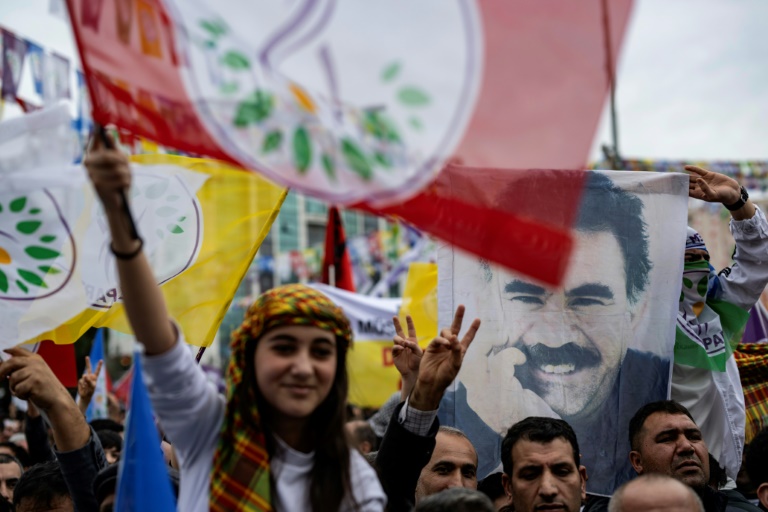As Turkey detains hundreds over suspected terror ties, questions arise about the government’s commitment to peace talks with the PKK. The simultaneous crackdown and reconciliation efforts paint a complex picture of Turkey’s approach to the decades-long conflict.
Turkey Arrests 282 Despite Reconciliation Bid With PKK

Key Takeaways:
- Turkey detained 282 people nationwide over suspected terror ties.
- The government is seeking to revive peace talks with the PKK after a decade-long freeze.
- The detentions coincide with peace efforts, causing skepticism among Kurdish communities.
- Analysts suggest the government aims to negotiate from a position of strength.
- Past failed peace initiatives and ongoing crackdowns lead to distrust over the reconciliation bid.
Nationwide Detentions Amid Peace Efforts
Turkey has detained 282 people in a sweeping operation targeting individuals with suspected “terror” ties, Interior Minister Ali Yerlikaya announced. The nationwide raids, conducted over the past five days, spanned 51 cities including Istanbul, Ankara, and the Kurdish-majority city of Diyarbakir in the southeast. Authorities issued arrest warrants for 60 people on Tuesday, encompassing members of the main pro-Kurdish DEM party, several left-wing figures, and journalists. So far, 52 individuals have been taken into custody, among them three journalists, according to the Turkish Journalists Union.
The Union criticized the manner of the arrests, stating, “It is unacceptable that they were detained during raids on their homes rather than being summoned to the police station.” DEM echoed the sentiment on social media, remarking, “Turkey woke up today with another operation against its members.”
Revival of Peace Talks with the PKK
Amid these actions, the Turkish government is seeking to revive peace talks with the Kurdistan Workers’ Party (PKK), designated as a terrorist group by Turkey and its Western allies. The negotiations, frozen for a decade, aim to end a bloody four-decade conflict that has claimed tens of thousands of lives. The process was rekindled in October when Devlet Bahceli, leader of the hardline nationalist MHP, extended an unexpected olive branch to the imprisoned PKK founder Abdullah Ocalan.
Since late December, a DEM delegation has visited Ocalan twice and held follow-up discussions with Turkey’s main parliamentary factions. On Sunday, the delegation traveled to Iraq to meet Kurdish representatives, including the autonomous region’s deputy prime minister Qubad Talabani.
Skepticism and Public Mistrust
Despite these peace overtures, skepticism abounds among Kurdish communities and political analysts. DEM suggested ulterior motives behind the detentions, stating, “It’s clear that the prospect of a solution and peace is beginning to keep some people awake at night.” In Diyarbakir, locals express doubts rooted in past experiences. Zeki Celik, who runs a silver workshop, shared his reservations: “Elected mayors are removed, there are ongoing police raids and journalists are rounded up. There’s been mistrust, so we don’t find it credible.”
Analysts on Government Strategy
Experts believe the government’s dual actions aim to strengthen its negotiating position. Sinan Ulgen of Carnegie Europe in Ankara observed, “It sends the message that if these negotiations don’t succeed, there is always this scenario of greater pressure on the members of DEM.” Similarly, Gonul Tol, head of the Turkish studies program at the Washington-based Middle East Institute, commented on President Recep Tayyip Erdogan’s approach: “On the one hand, he’s pursuing these talks with the PKK, but the second track is that he never actually really wholeheartedly owned it.”
Tol further explained, “Instead, he kept saying that this was an initiative led by Devlet Bahceli. And that second track also included ‘business as usual’ with the Kurds, meaning targeting them, jailing them, appointing mayoral replacements, thus capturing democratically-elected Kurdish municipalities.”
Historical Context and Ongoing Crackdowns
The mistrust is rooted in historical precedents. The collapse of the last peace initiative in 2015 led to a significant surge in violence. Since last year’s local elections, nine DEM mayors have been removed and replaced by government-appointed administrators, undermining local democratic representation. Ongoing police raids and the detention of journalists and party members exacerbate fears of a repeat of past failures.
The Uncertain Path to Reconciliation
Despite the challenges, there is cautious optimism among some Kurdish politicians that Ocalan will call on his followers to lay down their arms in the coming weeks, potentially by Newroz, the Kurdish New Year in March. However, the juxtaposition of peace negotiations with continued crackdowns leaves the prospect of lasting reconciliation uncertain. As the government navigates its complex strategy, the true commitment to ending the decades-long conflict remains in question.











